SuperFreakonomics
Global Cooling, Patriotic Prostitutes, and Why Suicide Bombers Should Buy Life Insurance
Steven D. Levitt &
Stephen J. Dubner

Contents
In which we admit to lying in our previous book.
: Putting the Freak in Economics
In which the global financial meltdown is entirely ignored in favor of more engaging topics.
The perils of walking drunkThe unlikely savior of Indian womenDrowning in horse manureWhat is freakonomics, anyway?Toothless sharks and bloodthirsty elephantsThings you always thought you knew but didnt.
How is a Street Prostitute Like a Department-Store Santa?
In which we explore the various costs of being a woman.
Meet LaSheena, a part-time prostituteOne million dead witchesThe many ways in which females are punished for being born femaleEven Radcliffe women pay the priceTitle IX creates jobs for women; men take them1 of every 50 women a prostituteThe booming sex trade in old-time ChicagoA survey like no otherThe erosion of prostitute payWhy did oral sex get so cheap?Pimps versus RealtorsWhy cops love prostitutesWhere did all the schoolteachers go?What really accounts for the male-female wage gap?Do men love money the way women love kids?Can a sex change boost your salary?Meet Allie, the happy prostitute; why arent there more women like her?
Why Should Suicide Bombers Buy Life Insurance?
In which we discuss compelling aspects of birth and death, though primarily death.
The worst month to have a babyThe natal roulette affects horses tooWhy Albert Aab will outshine Albert ZyzmorThe birthdate bulgeWhere does talent come from?Some families produce baseball players; others produce terroristsWhy terrorism is so cheap and easyThe trickle-down effects of September 11The man who fixes hospitalsWhy the newest ERs are already obsoleteHow can you tell a good doctor from a bad one?Bitten by a client at workWhy you want your ER doc to be a womanA variety of ways to postpone deathWhy is chemotherapy so widely used when it so rarely works?Were still getting our butts kicked by cancerWar: not as dangerous as you think?How to catch a terrorist.
Unbelievable Stories About Apathy and Altruism
In which people are revealed to be less good than previously thought, but also less bad.
Why did 38 people watch Kitty Genovese be murdered?With neighbors like theseWhat caused the 1960s crime explosion?How the ACLU encourages crimeLeave It to Beaver: not as innocent as you thinkThe roots of altruism, pure and impureWho visits retirement homes?Natural disasters and slow news daysEconomists make like Galileo and hit the labThe brilliant simplicity of the Dictator gamePeople are so generous!Thank goodness for donorcyclesThe great Iranian kidney experimentFrom driving a truck to the ivory towerWhy dont real people behave like people in the lab?The dirty rotten truth about altruismScarecrows work on people tooKitty Genovese revisited.
The Fix is inand Its Cheap and Simple
In which big, seemingly intractable problems are solved in surprising ways.
The dangers of childbirthIgnatz Semmelweis to the rescueHow the Endangered Species Act endangered speciesCreative ways to keep from paying for your trashForceps hoardingThe famine that wasntThree hundred thousand dead whalesThe mysteries of polioWhat really prevented your heart attack?The killer carThe strange story of Robert McNamaraLets drop some skulls down the stairwell!Hurray for seat beltsWhats wrong with riding shotgun?How much good do car seats do?Crash-test dummies tell no liesWhy hurricanes kill, and what can be done about it.
What Do Al Gore and Mount Pinatubo Have in Common?
In which we take a cool, hard look at global warming.
Lets melt the ice cap!Whats worse: car exhaust or cow farts?If you love the earth, eat more kangarooIt all comes down to negative externalitiesThe Club versus LoJackMount Pinatubo teaches a lessonThe obscenely smart, somewhat twisted gentlemen of Intellectual VenturesAssassinating mosquitoesSir, I am every kind of scientist!An inconvenient truthinessWhat climate models missIs carbon dioxide the wrong villain?Big-ass volcanoes and climate changeHow to cool the earthThe garden hose to the skyReasons to hate geoengineeringJumping the repugnance barrierSoggy mirrors and the puffy-cloud solutionWhy behavior change is so hardDirty hands and deadly doctorsForeskins are falling.
Monkeys are People Too
In which it is revealed thataw, hell, you have to read it to believe it.
The time has come to admit that in our first book, we lied. Twice.
The first lie appeared in the introduction, where we wrote that the book had no unifying theme. Heres what happened. Our publishing housenice people, smart peopleread the first draft of our book and cried out in alarm: This book has no unifying theme! Instead, the manuscript was a random heap of stories about cheating teachers, self-dealing Realtors, and crack-selling mamas boys. There was no nifty theoretical foundation upon which these stories could be piled to miraculously add up to more than the sum of their parts.
Our publishers alarm only grew when we proposed a title for this mishmash of a book: Freakonomics . Even over the phone, you could hear the sound of palms smacking foreheads: This pair of bozos just delivered a manuscript with no unifying theme and a nonsensical, made-up title!
It was duly suggested that in the published book we concede right up front, in the introduction, that we had no unifying theme. And so, in the interest of keeping the peace (and our book advance), thats what we did.
But in truth, the book did have a unifying theme, even if it wasnt obvious at the time, even to us. If pressed, you could boil it down to four words: People respond to incentives . If you wanted to get more expansive, you might say this: People respond to incentives, although not necessarily in ways that are predictable or manifest. Therefore, one of the most powerful laws in the universe is the law of unintended consequences. This applies to schoolteachers and Realtors and crack dealers as well as expectant mothers, sumo wrestlers, bagel salesmen, and the Ku Klux Klan .
The issue of the books title, meanwhile, still lay unresolved. After several months and dozens of suggestions, including Unconventional Wisdom (eh), Aint Necessarily So (bleh), and E-Ray Vision (dont ask), our publisher finally decided that perhaps Freakonomics wasnt so bad after allor, more precisely, it was so bad it might actually be good.
Or maybe they were simply exhausted.
The subtitle promised that the book would explore the hidden side of everything. This was our second lie. We were sure reasonable people would view such a phrase as intentional hyperbole. But some readers took it literally, complaining that our stories, as motley a collection as they were, did not in fact address everything. And so, while the subtitle was not intended as a lie, it turned out to be one. We apologize.
Our failure to include everything in the first book, however, had an unintended consequence of its own: it created the need for a second book. But let it be noted straightaway that this second book and the first book combined still do not literally comprise everything.
The two of us have now been collaborators for several years. It began when one of us (Dubner, an author and journalist) wrote a magazine article about the other (Levitt, an academic economist). Adversaries in the beginning, albeit civil ones, we joined forces only when several publishers began to offer significant sums of money for a book. (Remember: people respond to incentives and, despite the common perception, economists and journalists are people too.)

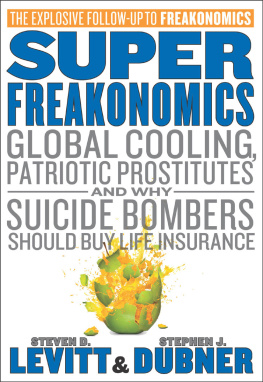
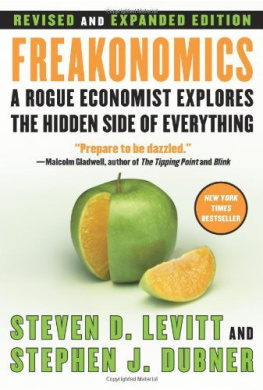
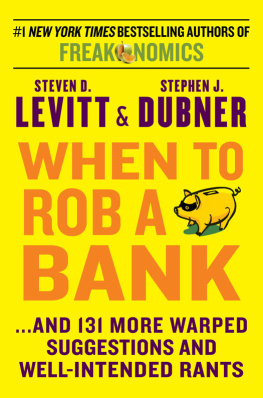
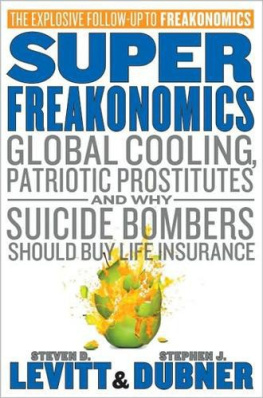
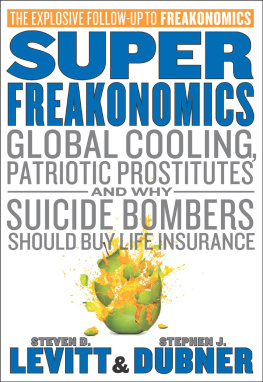
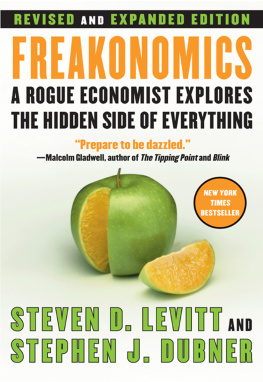
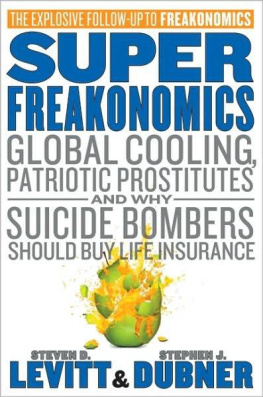
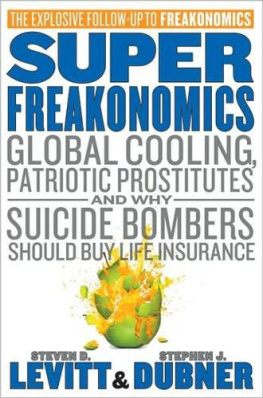
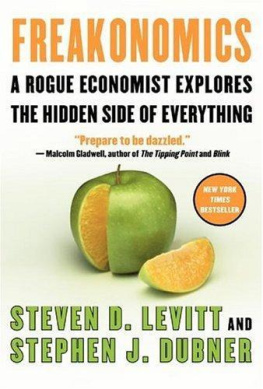

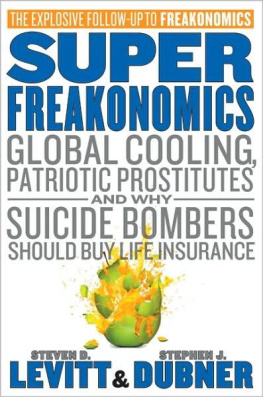
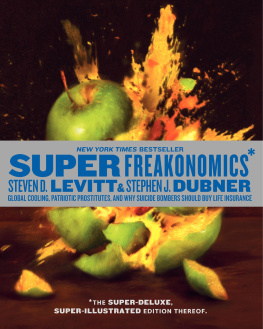
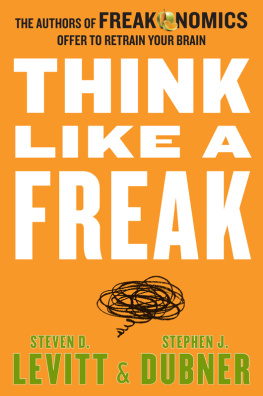
![Dubner Stephen J. - Super freakonomics : [global cooling, patriotic prostitutes and why suicide bombers should buy life insurance]](/uploads/posts/book/76604/thumbs/dubner-stephen-j-super-freakonomics-global.jpg)
